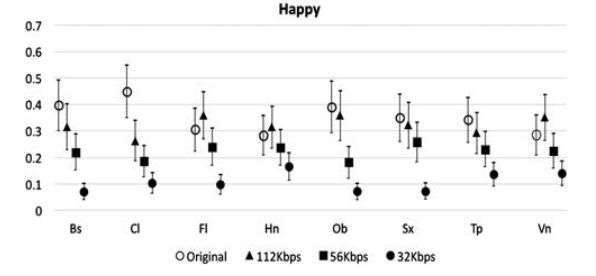December 12, 2016 report
File compression format found to alter timbre of music causing loss of some emotional context

(TechXplore)—A small team of researchers with Hong Kong University of Science and Technology has found that compressing recorded music into the MP3 format results in the loss of emotional tones, leaving the result with less depth. In their paper published in the Journal of the Audio Engineering Society, the researchers describe their study of the impact of compressing recordings of musical instruments and which instruments suffer the most degradation.
Most people who listen to music saved as an MP3 file know that the sound quality is lower than that of a CD or a vinyl album. But what is lost and by how much has not really been investigated. In this new effort, the researchers sought to learn which types of musical sounds lose the most emotional quality when a file is converted to MP3 and by how much.
The researchers enlisted the assistance of 20 grad students, each a native English speaker and each with normal hearing. All of the volunteers were asked to listen to recordings of several instruments: saxophone, violin, trumpet, oboe, bassoon, clarinet, flute and horn. Each was asked to rate the sounds they were hearing based on a list of emotional traits: romantic, calm, happy, shy, mysterious, angry, comic, sad and heroic. The researchers then analyzed the answers given by the volunteers to see if there might be any patterns. They found that most of the sounds that fell into the positive category were the most negatively impacted—romantic, calm, comic, heroic and happy were noticeably less present after files had been compressed into the MP3 format. They noted also that some instruments were more impacted than others—trumpets, for example, were found to have lost the most emotional timbre while other horns were impacted the least.
The researchers suggest that those people who are the most serious about tonal quality should limit their exposure to songs compressed into the MP3 format. They also suggest that the current trend in popular music toward growl-like tones or angry lyrics might have arisen due to their ability to translate well into the compressed file format.
More information: Ronald Mo et al. The Effects of MP3 Compression on Perceived Emotional Characteristics in Musical Instruments, Journal of the Audio Engineering Society (2016). DOI: 10.17743/jaes.2016.0031
Abstract
Musical instrument sounds have distinct timbral and emotional characteristics, and when audio processes are applied to them their timbral and emotional characteristics are changed. This paper investigates the effects of MP3 compression on the emotional characteristics of eight sustained instrument sounds using a listening test. We compared the compressed sounds pairwise over ten emotional categories at several bit rates. The results showed that MP3 compression strengthened neutral and negative emotional characteristics such as Mysterious, Shy, Scary, and Sad; and weakened positive emotional characteristics such as Happy, Heroic, Romantic, Comic, and Calm. Interestingly, Angry was relatively unaffected by MP3 com- pression. Probably, the background "growl" artifacts added by MP3 compression decreased positive emotional characteristics and increased negative characteristics such as Mysterious and Scary. For instruments, MP3 compression affected some instruments more and others less. The trumpet was the most effected and the horn by far the least.
© 2016 TechXplore




















